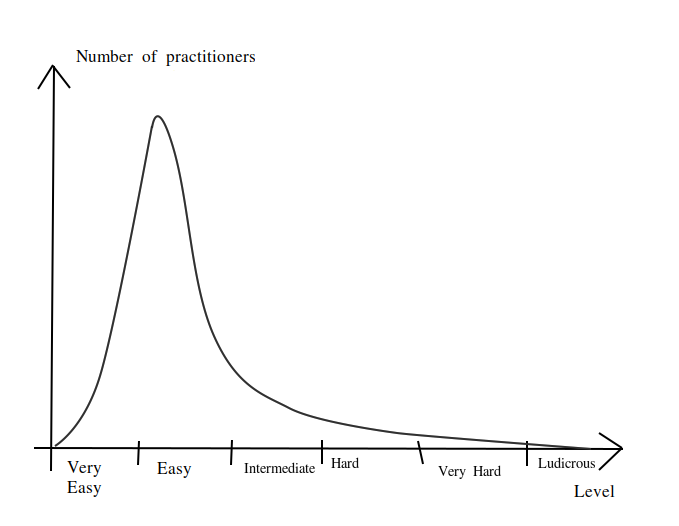When we want to assess the proficiency of someone in a given activity ("how good" this person is), we have 2 ways to measure it, which yield very different results.
The first way is to classify the activity by levels of proficiency, and see at which level someone currently belongs. For examples, video games usually have a customizable difficulty ranging from "Very easy" to "Very hard". Someone who only masters the "Very easy" level would be a noob player, while someone who masters the "Very hard" level would be a strong player.
The second way is to rank each practitioners of the activity, and look at what percentile of the dataset one's rank is. For example, someone who is better than 10% of all the players would be a noob, while someone who is better than 50% of all the players would be quite good, and someone who is better than 95% of all the players would be very strong.
The reason those 2 methods give different results is because practitioners aren't distributed uniformely across levels of proficency: most of the time, they are, in fact, distributed according to a decreasing exponential. As I have illustrated on the graph below, the vast majority of practitioners belong to the "Very easy" or "Easy" level, and then the number drops dramatically to leave only a few people in the advanced categories. (You should notice that I'm bad at graphing according to all definitions.)

One example is chess. In chess, the level of players is assessed thanks to a rating algorithm called the Elo rating system. 0 to 1200 ELO is considered novice; 1200 to 1800 ELO is considered intermediate; 1800 to 2000+ ELO is considered expert; the title of Grandmaster requires 2500 ELO; the best player in the world is 2860 ELO. Those are levels used for the definition n°1 of "being good".
On a platform like chess.com, if you are rated 1300 ELO, which, according to definition 1, means you just aren't a novice anymore and are just started being intermediate, it happens that you are better than 93% of active players of the site. Which, according to definition 2, means you are a strong player.
So, which is it, newly intermediate, or strong?
The answer is arbitrary, of course. Definition 2 is the one that is most used in practice in real-life, social types of situations. If you are the only guitar player in a small village, then you can go play the guitar at the Saturday night ball, and everybody will tell you how good a guitar player you are, even though this situation gives no insight about how well you play the guitar according to definition 1. If you beat your friends at every Mario Kart games with them, you are good at Mario Kart according to definition 2; there is no information about how good you are according to definition 1.
Definition 2 is at play when people don't know better. It's indeed very hard to appreciate the level of sophistication that a discipline can reach if you are less-than-mediocre in this discipline (and it's still hard when you are mediocre). Someone who didn't play at least 100 games of chess cannot begin to fathom what is happening in advanced chess. In such state of ignorance, anyone who is better than most is impressively good (what could there be more to achieve?)
Definition 1 makes its appearence whenever people have a demonstration of what is better. This is the case for sports, since they are very popular and high-level is constantly on display on TV. Motivational-miracle-morning-bullshitters can sell you a method to become a genius programmer in 6 months (because nobody understands programming), however they cannot sell you a method to become a genius footballer in 6 months (because everybody understands that 6 months aren't gonna make you become Lionel Messi).
Another case is whenever you connect to the Internet. YouTube has democratised the broadcast of high-level for any activity, so that whatever you do, and no matter how good you are at it in comparison to your friends, you can realize that you are, in fact, mediocre. (I have a theory that body perception issus in (young) people, which lead commentators to blame "fake bodies" and "photoshops" and "makeup" is actually just the application of the principle of this paragraph on beauty standards. Physiques on the high-level side of those standards are not "impossible", just extremely rare, but, thanks to Internet, ubiquitous.)
Finally, another case for definition 1 is academia. It's hard to think of yourself as "good" at something when you are at lesson 1 out of 100, or when you are reading chapter 1 of book 1 of a series of 10 books. Books are an extreme differentiator of definitions 1 and 2. Ask anyone a bit intellectually curious about randomness what a "black swan" is; you will receive the definition given in the first few lines of the introduction of the eponymous book, just before the author explains it's a bad definition and what the more precise meaning is. You just have to read the introduction of the book to become better than 95% of people talking about the subject.